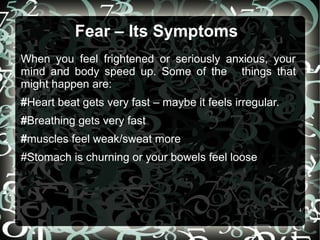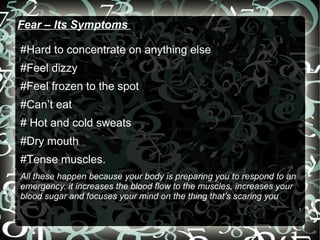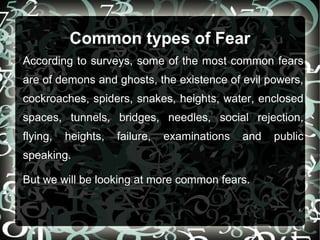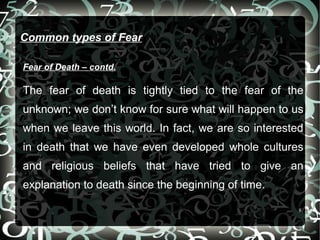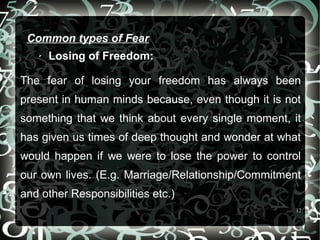Fear
- 1. FEAR
- 2. Outline ● Fear ● Common types of Fear ● Overcoming Fear ● Conclusion ● References ● Questions 2
- 3. Fear Fear is an emotion induced by a perceived threat which causes entities to quickly pull far away from it and usually hide. We can also feel fear when faced with less dangerous situations, like exams, public speaking, a new job, a date, or even a party. It is a natural response to something that a person feels is a threat. 3
- 4. Fear – Its Symptoms When you feel frightened or seriously anxious, your mind and body speed up. Some of the things that might happen are: #Heart beat gets very fast – maybe it feels irregular. #Breathing gets very fast #muscles feel weak/sweat more #Stomach is churning or your bowels feel loose 4
- 5. Fear – Its Symptoms #Hard to concentrate on anything else #Feel dizzy #Feel frozen to the spot #Can’t eat # Hot and cold sweats #Dry mouth #Tense muscles. All these happen because your body is preparing you to respond to an emergency. it increases the blood flow to the muscles, increases your blood sugar and focuses your mind on the thing that’s scaring you 5
- 6. Common types of Fear According to surveys, some of the most common fears are of demons and ghosts, the existence of evil powers, cockroaches, spiders, snakes, heights, water, enclosed spaces, tunnels, bridges, needles, social rejection, flying, heights, failure, examinations and public speaking. But we will be looking at more common fears. 6
- 7. Common types of Fear ➢ Fear of Death: Psychologists have addressed the hypothesis that fear of death motivates religious commitment, and that it may be alleviated by assurances about an afterlife. It is a well known truth that we all in the end will kick the bucket. But that doesn’t mean we have death as our worst everyday worry, because we avoid the thought of it as a near future occurrence in our lives. 7
- 8. Common types of Fear Fear of Death – contd. The fear of death is tightly tied to the fear of the unknown; we don’t know for sure what will happen to us when we leave this world. In fact, we are so interested in death that we have even developed whole cultures and religious beliefs that have tried to give an explanation to death since the beginning of time. 8
- 9. Common types of Fear ➢ Death anxiety: Death anxiety is the morbid, abnormal or persistent fear of one's own death or the process of his/her dying. One definition of death anxiety is a "feeling of dread, apprehension or solicitude (anxiety) when one thinks of the process of dying, or ceasing to ‘be’. 9
- 10. Common types of Fear ➢ Fear of the Unknown The fear of the unknown is easily explained like this: the mind tells us that in order to move forward, we must know what is waiting for us there, because “if I know, then I can control the situation, and if I don’t know, then I am not in control”. 10
- 11. Common types of Fear ➢ Fear of Survival According to Irfan Jamil, coadjutor bishop of Lahore, as the world constantly changes, the greatest fear is the fear of survival. The social, economical, spiritual, political and educational circumstances in life make survival difficult in regard to such pressures that can come out of it. 11
- 12. Common types of Fear ➢ Losing of Freedom: The fear of losing your freedom has always been present in human minds because, even though it is not something that we think about every single moment, it has given us times of deep thought and wonder at what would happen if we were to lose the power to control our own lives. (E.g. Marriage/Relationship/Commitment and other Responsibilities etc.) 12
- 13. Common types of Fear ➢ Disappointment The fear of disappointment is part of the reason we avoid the unknown, disappointment is that feeling of dissatisfaction when our expectations do not match what actually happened. 13
- 14. Common types of Fear ➢ Failure: The main fear of failing comes with the disappointment that follows, that feeling that despite your effort, nothing seemed to go as you wished it did, and it causes a feeling such that you might not even want to try again. 14
- 15. Common types of Fear ➢ Loneliness The fear of being alone is that dreadful feeling of emptiness caused by the absence of interaction with another human being. This fear has also evolved from one of our early survival instincts: we fear loneliness because it is more likely that we would survive if we live in group. 15
- 16. Overcoming Fear ● Face your fear if you can If you always avoid situations that scare you, you might stop doing things you want or need to do and you won’t be able to test out whether the situation is always as bad as you expect. ● Know yourself Try to learn more about your fear or anxiety. Keep a record of when it happens and what happens. 16
- 17. Overcoming Fear ● Relax Learning relaxation techniques can help you with the mental and physical feelings of fear. ● Exercise Take more physical exercise. This can trigger brain chemicals that improve your mood. 17
- 18. Overcoming Fear ● Faith/spirituality If you are religious or spiritual, this can help you feel connected to something bigger than yourself. It can provide a way of coping with everyday stress. Church and other faith groups can be a valuable support network. 18
- 19. Conclusion It's easy to ignore or deny our fears, even to ourselves, in a society that stresses the importance of being strong and brave, or among our peers, competitors. But courage can't come into play unless you have a fear to face down. By owning your feelings you've taken the first step toward gaining control over the situation. It call all be manage and dominate by us. 19
- 20. Questions 20




